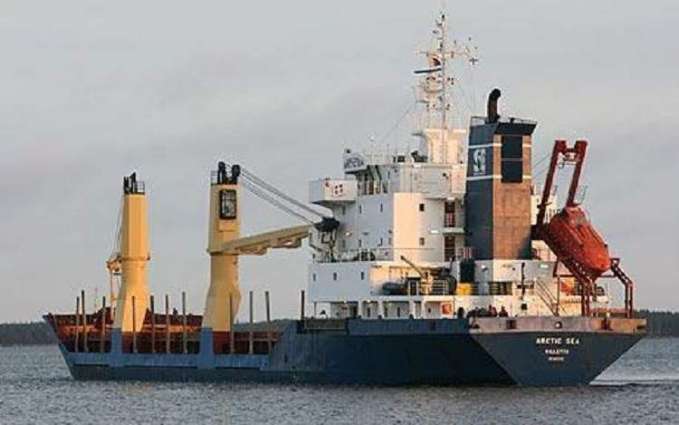Ten years ago, the Arctic Sea merchant cargo ship with a crew of 15 Russians was captured by a group of eight Estonians, Latvians and Russians while en route from Finland to Algeria
MOSCOW (Pakistan Point News / Sputnik - 24th July, 2019) Ten years ago, the Arctic Sea merchant cargo ship with a crew of 15 Russians was captured by a group of eight Estonians, Latvians and Russians while en route from Finland to Algeria.On July 22, 2009, the Arctic Sea, carrying about $2 million worth of timber cargo under the Maltese flag, left the Finnish port of Jakobstad and was expected to reach its destination, the port city of Bejaia in Algeria, by August 4. However, the vessel disappeared on July 28 radio contact was lost, and neither the ship-owner nor the relatives of the crew had any information about its whereabouts.
On August 12, then-Russian President Dmitry Medvedev instructed Anatoliy Serdyukov, the defense minister at the time, to take all necessary measures to detect, track and, if necessary, release the missing vessel.
A detachment of Russia's Black Sea Fleet vessels, namely the Ladny guard ship and three large landing ships, Yamal, Azov and Novocherkassk, joined the searches. Space satellites were also utilized.
According to Dmitry Rogozin, then-Russian permanent representative to NATO, Russia was exchanging information with NATO's Supreme Headquarters Allied Powers Europe, located in the Belgian city of Mons, daily. Rogozin also noted that Russia had not asked any states for help in finding the missing cargo ship.
On August 16, Swiss TSR tv network reported that unknown persons had demanded a $1.5 million ransom from Finland's Solchart Management, the cargo ship's operating company.
The following day, the Ladny naval vessel discovered the Arctic Sea near the West African island nation of Cape Verde.
The vessel was released without a single shot being fired, and the Russian Navy took the hijackers into custody.
As Serdyukov reported to Medvedev, the Arctic Sea was seized by a group of eight Estonians, Latvians and Russians.
On July 24, 2009, at 11:00 p.m. Moscow time (20:00 GMT), a high-speed motorboat carrying four Estonians, two Latvians and two Russians approached the Arctic Sea in Swedish territorial waters. The individuals used alleged troubles with their boat as a pretext to get up on the cargo ship. Once on board, they demanded at gunpoint that the crew unconditionally comply with all their orders. After that, the hijackers disabled the navigation equipment and re-routed the ship toward Africa.
On August 18, the Russian Investigative Committee initiated a criminal case under Article 126 of the Russian Criminal Code on the abduction of Russian citizens.
On August 20, 11 sailors and the alleged hijackers were transported to Russia by the nation's Air Force.
Moscow's Basmanny Court authorized the arrest of all eight suspects on August 21. Four days later, the court arrested the Arctic Sea cargo ship at the request of the Investigative Committee.
On August 27, it was reported that seven of the hijackers were charged with piracy and kidnapping committed by an organized group, while the eighth suspect was charged with organizing the crime. The defendants denied their guilt and insisted that they were just ecologists whose boat broke down.
One of the defendants, Russian national Dmitry Bartenev, asked the court to transfer the criminal case to Malta or Sweden since the incident occurred in Swedish territorial waters, and the vessel was traveling under the Maltese flag.
However, the prosecutor explained that, under maritime law, a vessel seized by pirates and detained in neutral waters belonged to the state that detained it. The prosecutor also stressed that, according to the constitution, Russia did not extradite its citizens for criminal prosecution. The court ruled in favor of the prosecutor's office.
The Moscow City Court then recognized the decision of the Basmanny Court as lawful.
When the case just emerged, media suggested that the cargo ship was carrying not only wood but drugs or even S-300 missiles. Once its probe was completed, the Russian Investigative Committee stated that no foreign cargo was detected aboard the vessel.
In early September, the Arctic Sea was towed to Spain's Las Palmas, where, according to the Investigative Committee, the ship's owner had to receive the vessel on September 17. This did not happen, and a few days later the cargo ship left the area. Russia then offered to tow the vessel to Algeria since the recipient of the timber being transported by the Arctic Sea was an Algerian company, but the North African nation refused to give the vessel permission to dock.
At the end of October, the cargo ship was towed to the Maltese port of Valletta, where it was handed over to the authorities.
The criminal case against the suspects was sent to court on November 19, 2010. The investigation and the court found that the suspects and other unidentified persons created an organized criminal group in Tallinn in 2009 in order to attack and rob ships.
The Moscow City Court sentenced two of the suspects, Dmitry Savins and Andrey Lunev, to seven and five years in prison, respectively.
Savins confessed that he had organized the hijacking together with Latvian businessman Sergey Demchenko. He also said that Estonian businessman and politician Eerik-Niiles Kross, a former foreign intelligence coordinator, had been the mission's mastermind. Savins went on to claim that the Arctic Sea had been chosen as the target at the last moment and that the key reason behind the choice had been the vessel's low speed and low sides.
On December 3, 2010, the Moscow City Court sentenced Demchenko, fully admitted his guilt and repented, to three years in a strict regime correctional colony. According to the investigators, Demchenko did not take part in the hijacking himself but helped prepare the pirates and later tried to sell the cargo ship.
Later in December 2010, the Arkhangelsk Regional Court started to try the hijacking case. The plaintiffs were the 15 crew members, company-owner Arctic Sea Ltd., as well as the head of Solchart Arkhangelsk, who was directly approached with the ransom demands.
On March 24, 2011, the Arkhangelsk Regional Court sentenced the six remaining defendants to prison terms of various duration.
In January 2012, the investigative department of the Investigative Committee in the Arkhangelsk Region charged Kross with organizing piracy. On October 18, 2013, at Russia's request, Interpol put Kross on the international wanted list.
Meanwhile, on October 23, 2013, Kross was appointed as an adviser to the Estonian defense minister; he resigned on January 29, 2014.




